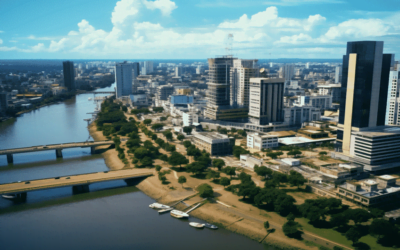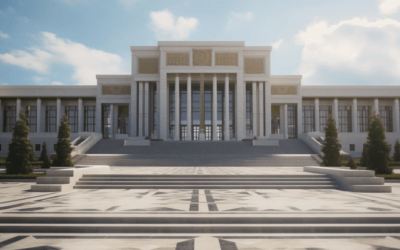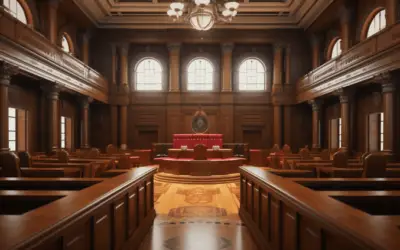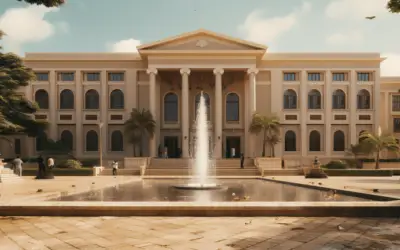Are you a drone enthusiast or a traveler curious about the drone laws in Lesotho? I understand that navigating the world of drone regulations can be perplexing, and you might be looking for answers.
Whether you’re a tourist planning to capture stunning aerial shots or a government operator with specific drone needs, Lesotho has its own set of rules in the drone airspace that you need to be aware of.
Rest assured, I’ve delved deep into the intricacies of Lesotho’s drone laws to provide you with clear insights. To ensure this content is as informative as it can be, I’ve conducted thorough research and compiled essential information from credible sources.
With this comprehensive understanding of Lesotho’s drone regulations, I aim to address your search intent by offering valuable guidance and solutions.
If you’re seeking the most up-to-date information on Lesotho’s drone laws, you’re in the right place. In the following sections of this article, we’ll explore the legal landscape governing drone flights in Lesotho, understand the do’s and don’ts, and discuss essential topics like permits, safety, and much more.
Whether you’re a first-time drone pilot or an experienced operator, read on to find out how Lesotho’s drone laws impact you and how you can enjoy safe and responsible drone operations in this beautiful African nation.
- Overview of Drone Laws in Lesotho
- Drone Laws for Tourists and Foreign Visitors
- Government Drone Operators in Lesotho
- Restricted and No-Fly Zones
- Altitude and Distance Restrictions
- Commercial Drone Operations
- Safety and Privacy
- Import and Export Regulations
- Staying Informed
- Final Thought on Lesotho Drone Laws
- Frequently Asked Questions on Lesotho Drone Laws
Overview of Drone Laws in Lesotho

Lesotho, a landlocked kingdom surrounded by South Africa, boasts breathtaking landscapes and picturesque terrain that drone enthusiasts and filmmakers find irresistible. However, before you send your drone soaring into the skies over this beautiful nation, it’s crucial to understand the regulatory framework that governs drone operations in Lesotho.
Let’s dive into the nuances of Lesotho’s drone laws to ensure your flights are safe, legal, and memorable.
Lesotho’s Regulatory Framework for Drone Operations:
Lesotho, like many countries, recognizes the need to regulate drone operations to ensure safety and responsible piloting.
The regulatory framework in Lesotho sets out rules and guidelines for operating drones within its borders. These laws apply to both residents and foreign visitors who wish to fly drones in Lesotho.
The primary aim of Lesotho’s drone regulations is to promote safety in the airspace. They specify where drones can and cannot fly, altitude limits, and the procedures for obtaining licenses and permits.
Additionally, Lesotho’s drone laws outline the legal responsibilities of drone operators, emphasizing the need to protect people, property, and the environment.
Also Read: Lebanon Drone Laws
Adhering to These Laws:
Adhering to Lesotho’s drone laws is not just a legal obligation but also a matter of ensuring safety and privacy. The regulations are designed to prevent accidents, protect individuals on the ground, and safeguard sensitive areas.
As a responsible drone operator, it’s essential to understand and follow these laws to mitigate the risks associated with drone flights.
By adhering to Lesotho’s drone laws, you contribute to the overall safety of the national airspace and maintain the positive image of drone enthusiasts. Violations of these laws can result in legal consequences, and the potential for accidents could tarnish the reputation of drone piloting in the country.
Therefore, understanding and respecting Lesotho’s drone laws is a crucial step toward enjoying your drone flights while preserving safety and compliance.
Also read: Latvia Drone Laws
Drone Laws for Tourists and Foreign Visitors

Exploring the stunning landscapes of Lesotho from the vantage point of a drone is an exciting prospect for tourists and foreign visitors.
However, when it comes to flying drones in this captivating kingdom, it’s essential to be well-versed in the laws and regulations that pertain to you as a visitor. In this section, we’ll unravel the specific drone laws that apply to tourists and foreign visitors in Lesotho.
Foreign Visitor Drone Flights – Allowed
As a foreign visitor in Lesotho, you’ll be pleased to know that drone flights are allowed, and the Lesotho Civil Aviation Authority (LCAA) welcomes drone enthusiasts to capture the beauty of the country from the air.
This permission means that you have the opportunity to create memorable aerial footage of Lesotho’s stunning landscapes and attractions. However, it’s crucial to understand the additional requirements and responsibilities that come with this privilege.
Requirement of a Foreign Visitor Drone Pilot License
To operate a drone in Lesotho as a foreign visitor, you are required to obtain a foreign visitor drone pilot license. This license ensures that you have the knowledge and skills necessary to pilot a drone safely in Lesotho’s airspace.
It’s important to note that the process for acquiring this license may involve specific requirements, so it’s advisable to get in touch with the LCAA or relevant authorities to understand the application process and any associated fees.
Drone Registration for Tourists
Drone registration is a mandatory requirement for tourists and foreign visitors who plan to operate drones in Lesotho. Registering your drone helps the authorities keep track of the drone population in the country and ensures accountability.
It’s essential to complete the registration process to avoid legal issues during your drone flights.
The Role of Drone Remote ID for Tourists
As of the last available information, Lesotho did not have a specific requirement for Drone Remote ID for tourists. Drone Remote ID is a system that broadcasts identification and location information of drones during flight.
However, it’s vital to stay updated on any changes or new regulations regarding Drone Remote ID, as drone laws can evolve.
The Importance of Drone Insurance for Tourists
While drone insurance is not mandated by Lesotho’s drone laws for tourists, it is highly recommended. Drone insurance can protect you financially in case of accidents, damage to your equipment, or liability issues.
It offers peace of mind and ensures that your drone adventures in Lesotho are worry-free. Before your trip, consider researching and obtaining a suitable insurance policy for your drone.
By understanding and complying with these drone laws for tourists and foreign visitors in Lesotho, you can enjoy your drone flights while respecting the country’s regulations and ensuring a safe and responsible aerial experience.
Also Read: Loas Drone Laws
Government Drone Operators in Lesotho

Government agencies in Lesotho also harness the power of drones for various applications, ranging from surveillance to disaster management. This section outlines the specific drone laws and regulations that apply to government drone operators in the kingdom.
Permissible Government Drone Operations
Government drone operators in Lesotho have the authorization to conduct a range of operations using drones. These operations may include surveillance, search and rescue missions, border patrol, monitoring critical infrastructure, and more. The government employs drones as a valuable tool to enhance safety and security.
Mandate of a Government Drone Pilot License
Just as with other drone operators, government drone pilots in Lesotho are required to hold a valid drone pilot license. This license ensures that government operators possess the necessary skills and knowledge to operate drones safely and effectively in compliance with regulations.
Drone Registration for Government Operations
Government drone operations also require drone registration. This process helps maintain accountability for the government’s drone fleet and ensures that drones are properly identified. The registration process may involve specific documentation and compliance with local authorities.
Drone Remote ID in Government Operations
As of the latest available information, Lesotho did not have a specific requirement for Drone Remote ID in government operations.
However, it’s essential to stay informed about any developments or changes in regulations regarding Drone Remote ID, as this technology is continuously evolving in many countries.
Insurance Requirements for Government Drone Operations
Unlike tourists who are recommended to have drone insurance, government drone operations in Lesotho do not have specific insurance requirements outlined in the available information.
However, government agencies often have their own insurance protocols and policies in place to cover potential liabilities and risks associated with drone operations.
Government drone operators play a crucial role in various aspects of public safety and governance in Lesotho.
Understanding and adhering to these drone laws ensures that government drone operations are carried out safely and in compliance with the regulations set by the Lesotho Civil Aviation Authority.
Also Read: Kyrgyzstan Drone Law
Restricted and No-Fly Zones

While the allure of capturing stunning aerial footage in Lesotho is undeniable, it’s equally important to be aware of the areas where drone flights are prohibited or restricted.
Understanding the reasons behind these restrictions and the consequences of violating no-fly zone regulations is essential for safe and responsible drone operations in the kingdom.
Drone Flights Are Prohibited or Restricted
Lesotho designates specific areas where drone flights are either restricted or entirely prohibited. Common examples of restricted areas include airports, government buildings, and other sensitive locations.
It is vital for drone operators to identify and respect these zones. Comprehensive maps and information regarding these areas can often be obtained from the Lesotho Civil Aviation Authority (LCAA) or relevant authorities.
The Reasons Behind These Restrictions
The restrictions on drone flights in certain areas are primarily implemented for safety and security reasons. Airports, for instance, require unobstructed airspace to ensure the safety of manned aircraft during takeoff and landing.
Government buildings and sensitive locations need to be protected from potential security risks associated with drones. Understanding the reasons behind these restrictions helps drone operators appreciate the necessity of compliance.
Consequences of Violating No-Fly Zone Regulations
Violating no-fly zone regulations can have serious consequences. Apart from endangering the safety of individuals and property, drone operators who breach these regulations may face legal penalties and fines.
Their equipment might be confiscated, and they could be subject to legal action. Moreover, violations can lead to the erosion of public trust and the reputation of drone enthusiasts, which affects the drone community as a whole.
Respecting and adhering to no-fly zone regulations in Lesotho is not only a legal obligation but also a fundamental responsibility for all drone operators. By doing so, you contribute to the safety and security of the nation while ensuring the preservation of the positive image of drone piloting.
Also Read: Kuwait Drone Laws
Altitude and Distance Restrictions

Navigating the skies with drones in Lesotho isn’t just about where you can fly but also how high and how far. Understanding altitude and distance restrictions is pivotal to safe and responsible drone operations in this captivating country.
Altitude and Distance Limitations for Drone Flights
Lesotho, like many other nations, imposes altitude and distance limitations on drone flights. These restrictions are in place to ensure the safety of both the drone operator and other airspace users.
While specific regulations may evolve, typical limitations include flying drones below a certain altitude and within a defined distance from the operator.
Safety Considerations and Their Importance:
The importance of adhering to altitude and distance restrictions cannot be overstated. These limitations are in place to prevent potential collisions with manned aircraft, protect people and property on the ground, and avoid interference with other drones.
Safety considerations include maintaining a safe buffer from obstacles, structures, and ensuring a clear airspace. They are essential for preventing accidents and maintaining the positive image of drone piloting.
Visual Line of Sight Requirements for Drone Operators
Visual Line of Sight (VLOS) requirements are a key safety measure for drone operators. It means that operators must maintain a clear line of sight with their drones during flights.
This is critical for maintaining control over the drone and avoiding collisions with obstacles or other aircraft. Understanding and adhering to VLOS requirements is fundamental to ensuring safe and responsible drone operations in Lesotho.
By adhering to altitude and distance restrictions, drone operators can enjoy their flights in Lesotho while contributing to the safety of the airspace and the people on the ground. Safety considerations, along with visual line of sight requirements, should be paramount in every drone enthusiast’s flight plan.
Also Read: Kosovo Drone laws
Commercial Drone Operations

For those looking to take their passion for drones to the professional level in Lesotho, it’s essential to understand the regulations governing commercial drone operations. This section delves into the specifics of commercial drone activities and the necessary permits, licenses, and compliance requirements.
Permits and Licenses Required for Commercial Drone Activities
Engaging in commercial drone operations in Lesotho often necessitates obtaining permits and licenses.
These are typically required for activities such as aerial photography, surveying, and other commercial applications. The specific permits and licenses required may vary based on the nature of the operation and the region in which it takes place.
Regulatory Requirements for Aerial Photography, Surveying, and Other Commercial Drone Applications
In Lesotho, regulations for commercial drone applications are designed to ensure that these operations are conducted safely and responsibly.
Regulatory requirements may encompass factors such as flight planning, risk assessments, and emergency procedures. Compliance with these regulations is critical to protect public safety and property.
Compliance with Additional Fees and Documentation
Commercial drone operators should be prepared to comply with additional fees and documentation requirements.
This can include fees associated with permit applications, as well as the need to submit documentation related to the operation, insurance coverage, and safety measures. It’s important to have a clear understanding of these financial and administrative obligations.
Engaging in commercial drone operations in Lesotho can be a rewarding venture, allowing you to leverage the capabilities of drones for various professional purposes.
However, it’s essential to navigate the regulatory framework effectively by obtaining the required permits and licenses, meeting the stipulated requirements, and ensuring full compliance with the additional financial and documentation obligations.
Also Read: South Korea Drone Law
Safety and Privacy

Drone operations, while thrilling and versatile, come with significant responsibilities. In Lesotho, these responsibilities encompass ensuring safety in the skies and respecting the privacy of individuals on the ground. Let’s explore the vital aspects of safety and privacy for drone operators.
The Responsibility of Drone Operators to Ensure Safe Operations
Safety is paramount in the world of drone piloting. Drone operators bear a significant responsibility for ensuring the safe and responsible operation of their drones.
This responsibility encompasses adhering to all relevant regulations, conducting pre-flight checks, maintaining equipment, and piloting drones in a manner that minimizes risks to other aircraft, people, and property.
Respect for Privacy Rights When Using Drones
Drones equipped with cameras and recording devices have the potential to intrude on people’s privacy. In Lesotho, as in many other countries, respecting privacy rights is an ethical and legal obligation.
It’s crucial for drone operators to be aware of and sensitive to people’s expectations of privacy. Avoiding flying over private properties, capturing intrusive images, or infringing on personal spaces is essential.
Ethical and Responsible Drone Piloting
Ethical and responsible drone piloting involves more than just complying with regulations. It means conducting flights with the utmost consideration for the well-being and privacy of others.
Drone operators should strive to be good neighbors in the sky, avoid disrupting wildlife, and ensure that their flights do not negatively impact the environment. Ethical piloting builds trust and ensures the long-term sustainability of the drone community.
By taking responsibility for safety, respecting privacy rights, and practicing ethical and responsible drone piloting, operators contribute to a positive image of drone enthusiasts and ensure the continued enjoyment and acceptance of drones in Lesotho’s airspace.
Also Read: North Korea Drone Laws
Import and Export Regulations

If you’re planning to bring your drone to Lesotho or take it back home after a memorable aerial adventure in the kingdom, understanding the import and export regulations is crucial. This section provides insights into the regulations and customs requirements that pertain to importing and exporting drones to and from Lesotho.
Regulations and Customs Requirements for Importing and Exporting Drones to/from Lesotho
Both importing and exporting drones to/from Lesotho involve regulations and customs requirements that ensure smooth and lawful transportation.
These requirements may include providing information about the drone’s specifications, purpose of use, and the duration of its stay in the country. Customs officials may assess import duties or taxes based on the drone’s value and intended use.
Necessary Documentation and Procedures for Drone Transport
To comply with import and export regulations, drone operators need to ensure they have the necessary documentation and follow proper procedures.
This can include obtaining a certificate of origin, providing detailed information about the drone, and adhering to established import/export protocols.
Depending on the specifics of the transport, operators may need to consult with customs authorities and shipping agencies to navigate the process effectively.
Navigating import and export regulations for drones is a critical part of traveling with your equipment. By ensuring that you have the requisite documentation and comply with the established procedures, you can avoid any potential legal complications and enjoy uninterrupted drone operations in Lesotho.
Also Read: Kiribati Drone Law
Staying Informed

The world of drone regulations is dynamic and subject to change. To remain a responsible and law-abiding drone operator in Lesotho, it’s vital to stay informed about any updates or revisions in the country’s drone laws.
In this section, we’ll explore the dynamic nature of these regulations and resources for staying up-to-date.
The Dynamic Nature of Drone Regulations
Drone regulations are continually evolving to keep pace with advancements in technology and emerging safety concerns. Lesotho is no exception, and its drone laws can change over time.
These changes may relate to altitude limits, no-fly zones, permit requirements, and other aspects of drone operations. Being aware of the dynamic nature of these regulations is critical to maintaining compliance.
Resources for Staying Updated on Changes in Lesotho’s Drone Laws
To stay informed about changes in Lesotho’s drone laws, drone operators can rely on several resources. The Lesotho Civil Aviation Authority (LCAA) is a primary source for official updates and announcements regarding drone regulations.
Additionally, online forums, industry publications, and local drone communities can provide valuable insights and real-time information about any modifications to the existing laws.
By keeping a vigilant eye on the evolving nature of drone regulations and leveraging available resources for updates, drone operators can adapt to changes, ensure compliance, and continue to enjoy safe and responsible drone operations in Lesotho.
Staying informed is not just a responsibility; it’s the key to preserving the integrity of drone piloting in the kingdom.
Also Read: Kenya Drone Law
Final Thought on Lesotho Drone Laws

Navigating the drone laws of Lesotho is an essential aspect of enjoying your aerial adventures in this captivating kingdom.
These regulations are not just legal requirements but crucial measures to ensure the safety and security of the airspace and the privacy of individuals on the ground.
Responsible and legal drone operations in Lesotho are at the core of preserving the positive image of drone enthusiasts.
As drone operators, we have a shared responsibility to ensure the safe and ethical use of drones, both for recreational and professional purposes.
By following the laws and regulations, we protect the skies, people, and property, contributing to a harmonious drone community.
To all drone enthusiasts and operators, I strongly encourage you to stay informed about Lesotho’s drone laws and regulations.
The dynamic nature of this field necessitates ongoing vigilance and adaptation. By following the rules, staying up-to-date on changes, and respecting safety and privacy, you not only have a memorable and enjoyable drone experience but also contribute to the continued acceptance and growth of drone piloting in Lesotho.
In conclusion, may your drone adventures in Lesotho be filled with breathtaking views, unforgettable moments, and a strong commitment to responsible and lawful drone operations.
Fly safely, fly responsibly, and embrace the incredible opportunities that drone technology brings to this remarkable
Frequently Asked Questions on Lesotho Drone Laws
Q1: Can I fly a drone as a tourist in Lesotho?
A1: Yes, drone flights are allowed for foreign visitors in Lesotho. However, it’s essential to obtain a foreign visitor drone pilot license and register your drone with the Lesotho Civil Aviation Authority (LCAA). While a Drone Remote ID is not required for tourists, having drone insurance is recommended for safe and responsible operations.
Q2: What are the regulations for government drone operators in Lesotho?
A2: Government drone operators in Lesotho can conduct various operations, including surveillance and search and rescue missions. They are required to have a government drone pilot license and register their drones. As of the available information, Drone Remote ID and specific insurance requirements for government operations are not mandated.
Q3: Are there no-fly zones in Lesotho, and what are the consequences of violating them?
A3: Yes, Lesotho designates no-fly zones and restricted areas to ensure safety and security. Violating these restrictions can have serious consequences, including legal penalties, fines, equipment confiscation, and potential legal action. Respecting no-fly zones is crucial to maintain safety and compliance.
Q4: What are the altitude and distance restrictions for drone flights in Lesotho?
A4: Lesotho’s drone laws impose altitude and distance limitations to ensure safe and responsible operations. Drone operators must typically fly below a specified altitude and within a defined distance from the operator. Adhering to these restrictions is crucial to prevent accidents and maintain the safety of the airspace.
Q5: What permits and licenses are required for commercial drone activities in Lesotho?
A5: Engaging in commercial drone operations in Lesotho may require permits and licenses. The specific permits and licenses needed can vary based on the nature of the operation.
Operators should be prepared to comply with additional fees and provide documentation related to their commercial activities. It’s advisable to consult with customs authorities and relevant agencies to navigate the process effectively.













